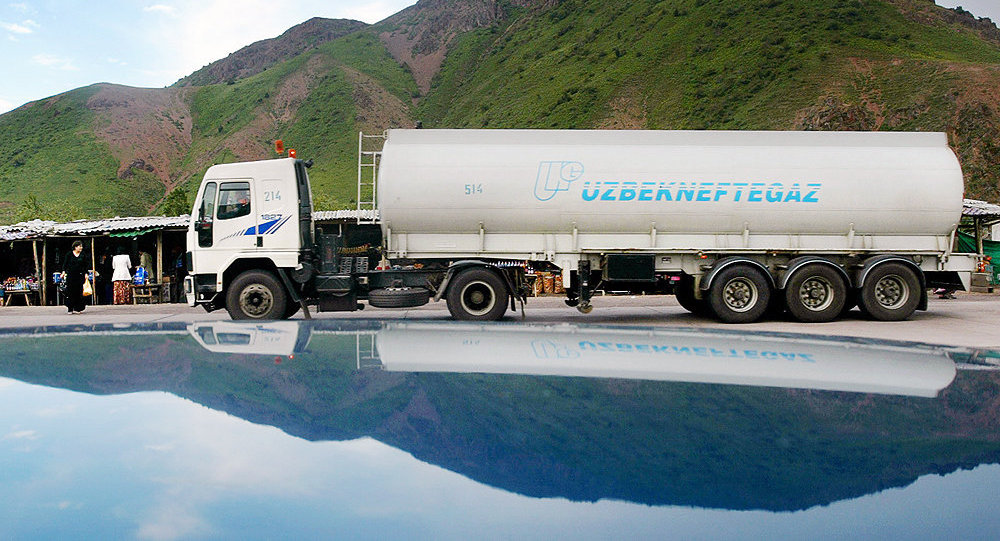Azerbaijan’s state-run energy conglomerate SOCAR and British energy giant BP attended the Uzbek International Exhibition headlined “Oil & Gas Uzbekistan – OGU 2018,” in Uzbekistan’s capital Tashkent on May 16, where the two sides made an agreement with Uzbekneftegaz Company for exploring and developing fossil fuel fields within the landlocked Central Asian country.
Two Memorandums of Understanding were signed by all three companies, calling for joint exploration and development of oil and gas deposits in Uzbekistan, and exploring the possibilities for geological exploration of hydrocarbon blocks.
"The documents provide for the study of materials based on geological prospecting,” SOCAR’s Vice President Bahram Huseynov told Sputnik. “BP is our partner. In addition to these documents, we are also discussing the possibility of participation of the Uzbek side in geological explorations in Azerbaijan."
The agreements pave the way for Uzbekistan to gain access to applying advanced foreign technologies and methods, increasing the country’s efficiency regarding hydrocarbon exploration and production, as well open new deposits and improve the skills of domestic specialists.
Uzbekistan is one of the world’s two double landlocked countries, meaning at least two international borders must be crossed before goods and people can reach a major body of water connected to the world’s oceans. Rich in hydrocarbons, the Central Asian Turkic state is bordered by Kazakhstan to the northwest and north, Kyrgyzstan and Tajikistan to the east and southeast, Afghanistan to the south, and Turkmenistan to the southwest.
Some Uzbekistani officials claim that two thirds of the country’s area sits atop oil and gas reserves that have, for the most part, been untapped. Proven crude oil reserves are approximately 594 million barrels, ranking it number 47 in the world; and natural gas reserves measuring 1.84 trillion cubic meters, putting it at number 20 among the world countries, according to U.S. government data.
In 2014, the country extracted the third largest amount of natural gas in Eurasia, falling behind only Russia and Turkmenistan. Qashqadaryo province, located in the southeast and near Bukhara city in the south-central region, is where most gas is located. The largest known deposit is Boyangora-Gadzhak, found in the southeastern province of Surkhondaryo.
The Bukhara-Khiva region in the southwest is the largest of Uzbekistan’s oil-rich areas, holding 60 percent of known deposits and 70 percent of the country’s production. The northeastern Mingbulak and western Qoqdumalaq regions are considered the second and third ranking oil rich regions out of a country of 32 million people.
Over the past few years, Uzbekneftegaz discovered 211 hydrocarbon deposits in Uzbekistan, 108 of which are gas and gas condensate fields. The remaining 103 are identified as oil and gas, oil and gas condensate, and oil.
Nizhny Surgil is one of the most recently discovered gas fields, found in January of this year and located on the border with Kazakhstan. Industrial reserves of gas condensate that were discovered in Nizhny Surgil lie at the depth of 3,600 meters.
In 2016 and 2017 Uzbekneftegaz penned two documents with SOCAR on joint exploration and development of hydrocarbon reserves located in Uzbekistan and Azerbaijan. SOCAR pledged to train Uzbek oil and gas specialists, while also inviting engineers from Uzbekistan to join the projects for exploring fossil fuel reserves in Azerbaijan’s portion of the Caspian Sea.
Farhad Tolipov, head of the non-governmental Bilim Carvoni (“Karavan of Knowledge”) educational institution in Tashkent, says cooperation with Azerbaijan is the best opportunity for Uzbekistan to diversify its exports of energy resources and reach the European marketplace.
“Back in the 1990s, Uzbekistan counted on future supplies of hydrocarbons through Azerbaijan to the West,” Tolipov said, according to EurAsia Daily. “Even the possibility of Tashkent joining the Baku-Tbilisi-Ceyhan strategic oil pipeline project was discussed. Uzbekistan and Azerbaijan for a long time participated jointly in the preparation of the TRACECA (Transport Corridor Europe-Caucasus-Asia) project.
“During the construction of the Southern Gas Corridor, the situation with the routes of gas transportation from the Caspian eastern shore to Azerbaijan will become clear. Regardless of whether this will be a pipeline transport of hydrocarbons along the Caspian seabed or with tankers as liquefied gas, Tashkent is interested in the transit of surplus gas through Azerbaijan and further to European markets.”







 Azerbaijan and Armenia started the process of demarcation of their border on Tuesday, with the installation of the first border markers based on ge...
Azerbaijan and Armenia started the process of demarcation of their border on Tuesday, with the installation of the first border markers based on ge...
 Armenian sappers commenced on Monday mine-clearance operations in the territories adjacent to the Saint Mary Church in village of Voskepar (Armenia...
Armenian sappers commenced on Monday mine-clearance operations in the territories adjacent to the Saint Mary Church in village of Voskepar (Armenia...
 Iran and Pakistan have signed eight cooperation documents in various fields, and agreed to strengthen ties to fight terrorism in the region.
Iran and Pakistan have signed eight cooperation documents in various fields, and agreed to strengthen ties to fight terrorism in the region.
 President Aliyev emphasized the critical role of the North-South Transport Corridor in fostering transport cooperation between Azerbaijan and Russi...
President Aliyev emphasized the critical role of the North-South Transport Corridor in fostering transport cooperation between Azerbaijan and Russi...



